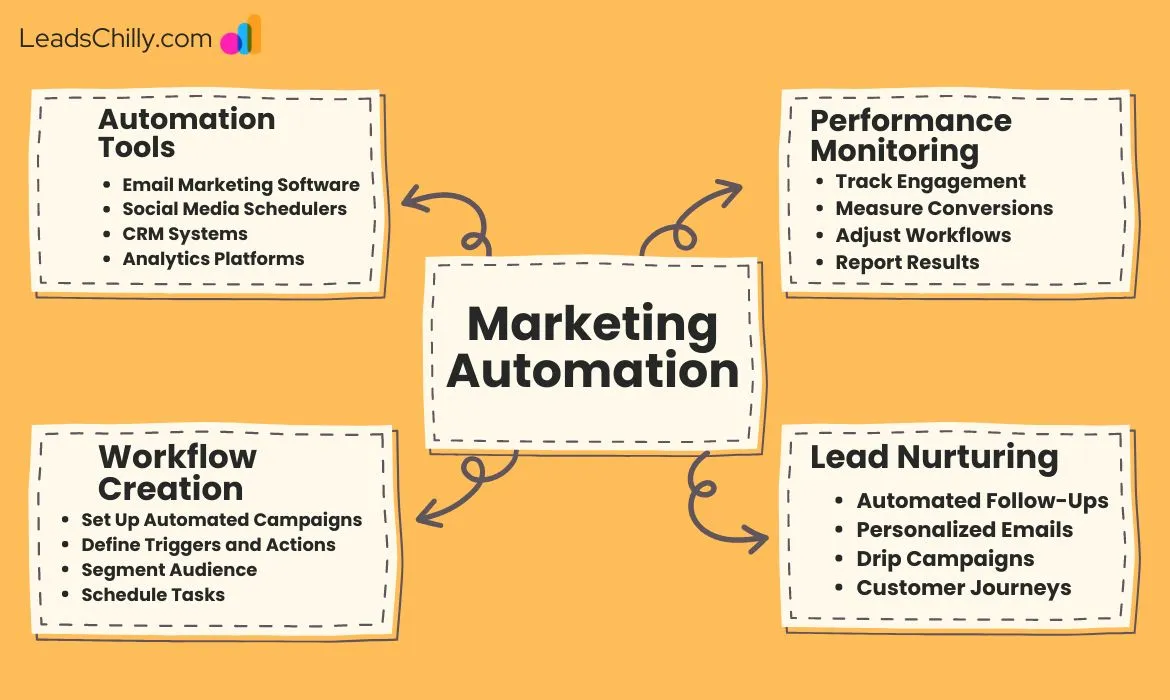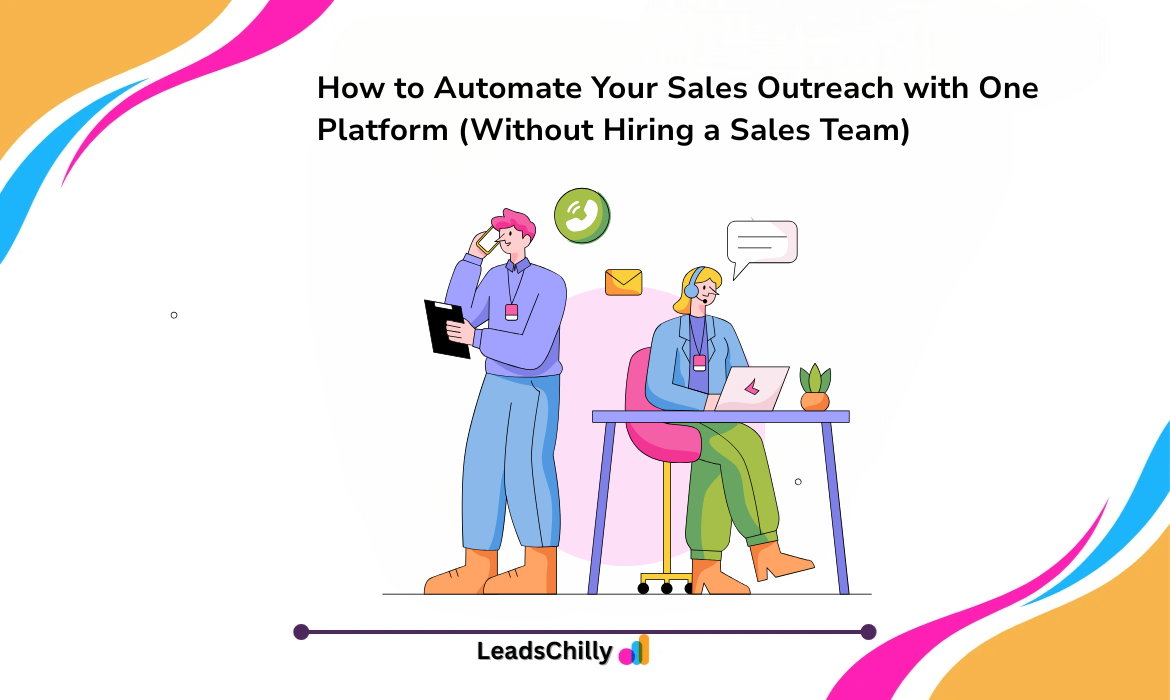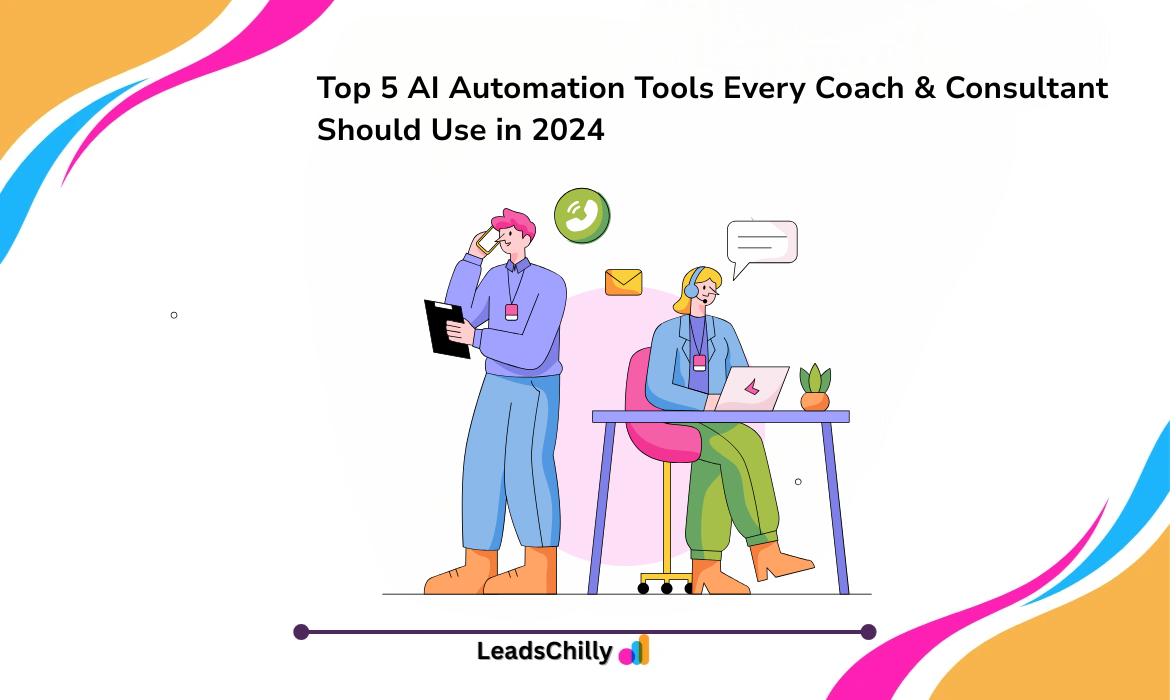Marketing automation is a way of using technology to manage marketing processes and campaigns automatically across multiple channels and to automate repetitive tasks. This lets businesses operate more efficiently and target customers with automated messages across email, SMS, social media, and the internet.
It uses software to handle many marketing tasks automatically, such as sending emails and tracking customer behavior online. This makes it easier to identify and convert potential customers, or “leads,” into actual buyers.
In this guide, we will explain what marketing automation lead generation is and how it can help your business get more customers. We’ll discuss the basics of automated marketing, how it benefits marketers, and how companies use these tools to save time and work smarter.
What Is Marketing Automation Lead Generation?
Marketing automation lead generation refers to using technology to find potential customers (leads) and guide them toward making a purchase. This process includes automating various tasks like sending personalized emails, tracking website visits, and managing social media campaigns.
Key Components of Marketing Automation Lead Generation
- Lead Scoring and Segmentation: Automatically ranks leads based on their interest level and actions, ensuring that marketers focus on the most promising prospects.
- Email Marketing Automation: Sends the right emails at the right time to nurture leads and keep them engaged.
- Behavioral Tracking: Monitors what leads do on websites, in emails, and on social media, allowing for targeted marketing strategies.
- Landing Page Optimization: Tests and improves web pages to maximize conversions.
- Multi-Channel Campaign Management: Manages campaigns across various platforms, including emails, social media, and SMS.
Marketing Automation: A Growing Industry
Interest in marketing automation software has increased over the last few years, and that trend looks set to continue.
The global marketing automation solution market, which was valued at more than $2.74 billion in 2021, is projected to reach $4.69 billion by 2028, with a compound annual growth rate of 7.9%. The rise of cloud computing and social media platforms has enabled this explosive growth.
Lead generation is a time-consuming, but essential, part of keeping any business competitive and thriving. The good news? Switching to automated lead generation can save time, increase productivity, and get you higher-quality leads, all of which contribute to greater revenue growth!
How Does Marketing Automation Help Marketers?
Marketing automation provides several benefits that help marketers work smarter, not harder:
1. Increased Efficiency
Automation tools handle repetitive tasks, allowing marketers to focus on strategy and creative work. Tools like LeadsChilly can set up workflows that manage follow-ups, lead nurturing, and customer engagement automatically.
2. Enhanced Lead Nurturing
Deliver personalized content that speaks directly to each lead’s interests. Automated campaigns help build trust and engage leads over time, increasing the likelihood of conversion.
3. Better Data Insights
Get real-time data on how well your campaigns are performing. This information helps in making smart decisions and improving future marketing efforts.
4. Improved Lead Quality
By scoring and prioritizing leads, businesses can focus on the ones most likely to convert into customers, improving overall sales effectiveness.
5. Cost Savings
Reduce costs by automating tasks, lowering the need for a large marketing team while maintaining high performance
How Marketing Automation Can Help in Lead Generation
Marketing automation assists in multiple ways, from targeting the right audience to maintaining consistent engagement:
- Target the Right Audience: Use data analytics to identify and engage your ideal customers.
- Personalized Outreach: Create messages and content tailored to specific customer needs and behaviors.
- Lead Scoring and Prioritization: Automatically rate leads based on their behavior and engagement to focus on those most likely to convert.
- Automated Follow-Ups: Stay in touch with leads through automated reminders, ensuring no opportunity slips through the cracks.
Benefits of Marketing Automation
- Saves Time: Automates repetitive tasks, freeing up valuable time for marketers.
- Increases Engagement: Sends personalized messages that resonate with specific audiences.
- Improves Decision-Making: Provides insights and data analysis for better strategic planning.
What Is Automated Marketing?
Automated marketing uses software tools to manage and automate marketing tasks. This includes scheduling social media posts, sending personalized emails, segmenting audiences, and analyzing data to enhance marketing strategies.
Common Automated Marketing Tasks
- Email and Social Media Marketing: Automate content delivery to reach the right audience at the right time.
- Customer Segmentation: Group customers based on behaviors, interests, or demographics to deliver personalized experiences.
- Campaign Management: Run and monitor campaigns efficiently to optimize performance.
- Data Analysis and Reporting: Track key metrics to understand what’s working and what isn’t.
How Do Companies Use Marketing Automation?
Companies use marketing automation tools for various purposes, including but not limited to:
Email Campaigns
Automate the sending of targeted, personalized emails to nurture leads and maintain consistent communication. Tools like LeadsChilly offer features to design, schedule, and track the effectiveness of email campaigns.
Lead Nurturing
Create workflows that guide leads from initial interest to purchase. By automating nurturing tasks, marketers can ensure that every lead receives the right message at the right time.
CRM Integration
Seamlessly sync customer data and interactions between sales and marketing teams to create a unified customer experience. This integration ensures that all teams have access to real-time information about customer behavior and preferences.
Social Media Management
Automate posts, track engagement, and analyze performance to enhance social media marketing efforts. This helps maintain a consistent brand presence across various social platforms.
Popular Use Cases
- Managing and Optimizing Email Marketing: Automate and optimize email campaigns to improve open and click-through rates.
- Streamlining Social Media Campaigns: Schedule posts, track engagement, and adjust strategies based on real-time data.
- Enhancing Customer Follow-Ups and Engagement: Automate follow-ups to ensure timely and relevant communication with leads.
Marketing Automation vs. Customer Relationship Management (CRM)
|
Feature |
Marketing Automation |
Customer Relationship Management (CRM) |
|
Purpose |
Automates marketing tasks |
Manages customer data and relationships |
|
Focus |
Lead generation and nurturing |
Customer retention and relationship building |
|
Example Tools |
LeadsChilly, HubSpot, Marketo |
Salesforce, Zoho CRM, HubSpot CRM |
Understanding the Differences
- Marketing Automation focuses on creating, executing, and measuring marketing campaigns. It is ideal for companies looking to streamline marketing processes and improve lead generation.
- CRM tools manage customer data and interactions to enhance customer service and retention. They are essential for businesses that prioritize maintaining strong customer relationships.
Marketing Automation Tools and Features
There are numerous tools available for marketing automation, each with unique features:
- Email Marketing: Create, send, and track email campaigns to engage and nurture leads.
- Lead Scoring: Evaluate and prioritize leads based on their behavior and likelihood to convert.
- Analytics: Measure campaign performance, return on investment (ROI), and other key metrics.
- A/B Testing: Optimize content by testing different versions to determine what works best.
Popular Marketing Automation Tools
- LeadsChilly: Specializes in lead generation and nurturing with powerful automation features.
- HubSpot: Offers comprehensive marketing and sales automation tools for businesses of all sizes.
- Mailchimp: Focuses on email marketing and audience segmentation for small to medium-sized businesses.
How to Automate Your Lead Generation?
To automate your lead generation effectively, follow these steps:
Step-by-Step Guide
- Choose the Right Platform: Select a tool like LeadsChilly that fits your business needs and budget.
- Define Your Workflow: Map out the steps to guide leads through the funnel, from initial contact to final conversion.
- Set Up Lead Scoring: Use criteria like engagement level, demographic data, and buying signals to score and prioritize leads.
- Personalize Content: Use automation to send targeted messages tailored to each lead’s interests and behaviors.
- Monitor and Optimize: Regularly review analytics and adjust your strategy based on performance data.
Steps for Effective Lead Generation Automation
- Select Tools: Choose tools that match your specific business needs.
- Create Workflows: Design detailed steps to guide customers through their journey.
- Optimize Content: Utilize A/B testing to refine messaging and increase engagement.
Common Marketing Automation Integrations
To maximize the benefits of marketing automation, integrate with other essential tools and platforms:
Integration Examples
- CRM Systems: Sync data between marketing and sales teams for seamless lead management.
- Social Media Platforms: Automate posts, track engagement, and analyze social media performance.
- Analytics Tools: Integrate with analytics platforms to measure and improve marketing performance.
Benefits of Integrating Marketing Automation
- Streamlined Processes: Creates a unified approach to managing leads and customers.
- Improved Data Accuracy: Ensures all teams have access to consistent and accurate data.
- Enhanced Customer Experience: Provides a seamless journey from initial contact to conversion.
Choosing a Marketing Automation Platform: B2B vs. B2C
When selecting a marketing automation platform, consider whether your business targets other businesses (B2B) or individual consumers (B2C).
B2B vs. B2C Considerations
- B2B: Focuses on lead nurturing and account-based marketing. Key platforms include LeadsChilly, Pardot, and HubSpot.
- B2C: Prioritizes customer experience and engagement. Tools like ActiveCampaign and Mailchimp are popular choices for consumer-focused businesses.
Factors to Consider
- Business Size: Determine the scalability and customization options needed.
- Budget: Evaluate the cost of different platforms
relative to your budget. - Features: Choose tools that offer the features most relevant to your marketing strategy.
Marketing Automation Platform Pricing
The cost of marketing automation platforms can vary widely based on features, the number of users, and the size of the business. Here’s an overview of typical pricing for different business sizes:
Pricing Tiers
- Small Businesses: Plans typically start around $20 – $200 per month, depending on the features and number of users.
- Mid-Sized Businesses: Plans range from $200 – $1,000 per month, offering more advanced features and capabilities.
- Enterprises: Custom plans can go beyond $1,000 per month, often tailored with specialized services, additional users, and dedicated support.
LeadsChilly Pricing
LeadsChilly offers an all-inclusive pricing plan for $497 per month. This plan includes unlimited access to all features, such as:
- Unlimited Landing Pages and Website Builder: Create as many landing pages and websites as needed.
- Unlimited Contacts and Users: Add an unlimited number of contacts and users.
- AI-Powered Automation: Utilize AI for customer queries, automated follow-ups, and multi-channel communication (SMS, email, WhatsApp, and voice).
- Unlimited Funnels and Lead Magnet: Build unlimited sales funnels and lead magnets.
- API Access: Integrate with other tools and platforms.
- Branded Desktop App: Full customization control over the platform’s look and feel.
- 24/7 Customer Support: Access to round-the-clock support for any issues or questions.
LeadsChilly provides all the necessary tools for scaling your business efficiently without hidden costs or complicated pricing tiers, making it a cost-effective choice for businesses of all sizes.
How to Choose the Right Plan
- Assess Your Needs: Identify the critical features your business requires, such as email automation, lead scoring, or multi-channel communication.
- Compare Platforms: Evaluate different platforms by looking at pricing, customer support, and ease of use. Platforms like LeadsChilly offer comprehensive features that might align with your needs.
- Consider Future Growth: Choose a platform that can scale with your business as it grows, ensuring you don’t outgrow the tool quickly.
LeadsChilly’s pricing and features offer a competitive edge, particularly for businesses looking for an all-in-one solution without the hassle of managing multiple tools and subscriptions.For more details, visit LeadsChilly’s official website to explore their pricing options and start with a 14-day free trial
Conclusion
Marketing automation lead generation is a powerful strategy for businesses seeking to optimize their marketing efforts, nurture leads effectively, and drive more sales. With the right tools and techniques, marketers can significantly improve their efficiency, engagement, and conversion rates.
Whether you are a small business or a large enterprise, investing in marketing automation can enhance your lead generation strategy, drive more sales, and help your business grow. Try the demo with leadschilly’s 14-day free trial and see how it can transform your marketing efforts!
FAQs
Q1. How does marketing automation help in lead generation?
Marketing automation helps by automating tasks, targeting the right audience, and delivering personalized messages, making the lead generation process more efficient and effective.
Q2. What is the difference between marketing automation and CRM?
Marketing automation focuses on generating and nurturing leads, while CRM manages customer relationships and data.
Q3. What are some common marketing automation tools?
Popular tools include LeadsChilly, HubSpot, Marketo, and Mailchimp, each offering different features for automating marketing tasks.
Q4. How do you choose a marketing automation platform?
Consider your business size, goals, budget, and specific needs when choosing a platform. Look for features that align with your marketing strategy.
Q5. How can I get started with marketing automation?
Start by choosing a platform like LeadsChilly, define your workflows, set up lead scoring, personalize your content, and regularly monitor and optimize your campaigns.




Comments are closed.